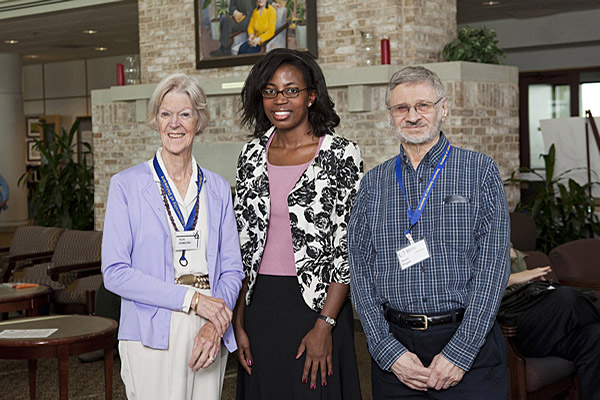
DELPHI presentations
UD public engagement institute begins June 4 with new name
10:28 a.m., June 4, 2012--A punch bowl in the China trade; citizen soldier monuments; lynching memorials remembering a dark past. These and other fascinating artifacts populate the syllabus of the "Objects as Cultural Artifacts" class at the Osher Lifelong Learning Institute at the University of Delaware in Wilmington, UD’s member-based teaching and learning program for those over 50.
The course is presented by graduate students from UD’s Delaware Public Humanities Institute (DELPHI) whose material culture research spans history, literature, art history, art conservation and more.
Campus Stories
From graduates, faculty
Doctoral hooding
Now in its fifth year, the institute begins on Monday, June 4, with a new name that directly connects the institute with the University of Delaware and the state and provides a more memorable and classic acronym, DELPHI. The two-week program is directed by Arwen Mohun, UD associate professor of history, and Erik P. Rau, Hagley Museum and Library’s director of library services.
Originally known as the Public Engagement in Material Culture Institute (PEMCI), the program is funded by a grant from National Endowment for the Humanities (NEH) to encourage and train graduate students to communicate their research to the public. The institute gives graduate students hands-on experience in public speaking, interviews, media training for radio and TV, and writing press releases.
The Osher presentations serve as an excellent opportunity for the graduate students to practice what they've learned in the institute, and fulfill the outreach requirements of the NEH grant, said Deborah Andrews, English professor and director of the Center for Material Culture Studies. Osher members, in turn, learn about research taking place at UD, she added.
Last semester, art history doctoral student Sarah Beetham presented her research on the emergence of the "citizen soldier monument" as public sculpture after the Civil War. "The public engagement workshops really helped develop my skills in public speaking. I enjoyed presenting at the lifelong learning program," said Beetham. "The art historian plays a crucial role in working with the public to come up with new ways to think about and preserve public art. Much more so than art in museums, public works are accessible for people to visit and learn from, and they are owned by the community. Art historians who specialize in public engagement can convey why that process is so important."
For her Osher presentation entitled "An Ocean of Punch," art history graduate student Emily Casey discussed the cultural and political symbolism of porcelain punch bowls brought back on the Empress of China American trade ship and displayed in American parlors. "While my background in museum education has always made me committed to public education, I struggled to find a way to connect my graduate research with non-academic audiences," commented Casey, whose research centers on the material culture of the early American China trade. "It was through the experience of the workshops, where I practiced describing my work to different people in numerous contexts, that I grasped how exciting my research could be to the general public."
Class is win-win
Earning an award in 2009 from the University Continuing Education Association for its unique cooperative format, the class is a win-win, across-campus project, commented Jim Broomall, assistant provost of professional and continuing studies, which oversees UD's Osher lifelong learning programs. "There is wonderful dialogue between the graduate students and lifelong learning students," said Broomall. "Osher Lifelong Learning is proud to provide a forum for emerging scholars to share their research with an engaged community of learners. It illustrates the positive synergy between the Osher program and UD."
Coordinating on the lifelong learning side, Nan Norling and Stuart Siegell both have taught art history courses in the Osher program. Norling is a graduate of UD's Master of Arts in Liberal Studies (MALS) program and Siegell is a docent at the Delaware Art Museum.
"Learning about different objects and art takes you places you never thought you'd go," commented Norling. "This course continues to attract an audience of 60 or more each week, many of whom come back every year." Siegell added, "We are delighted that previous presenters have returned this semester to update us on their research."
'They want you to succeed'
Many of the students are nervous as they face a large audience in a large room. But Andrews reminds them of advice from Siegell, "Think of the audience as your grandparents. They want you to succeed."
La Tanya Autry is one of the course’s repeat presenters, a doctoral student in art history studying the history of lynching in America by examining lynching memorials. She's given many outreach presentations in addition to the ones at Osher. "I find it helpful to present my research to people from various backgrounds. In addition to encouraging me to see the project with fresh eyes, the comments and questions often point the way to other approaches or research sources," commented Autry. "Although working on the dissertation is rigorous, it feels good to know that many people are interested in my project."
Initially reticent about blogging and tweeting, Autry credits the public engagement workshops with helping her understand the outreach potential of social media. "Now I'm an avid fan of various social platforms, and I understand how social media can vastly broaden my reach to diverse people," said Autry.
And while she's always had a great interest in sharing her topic through outreach, Autry says the experience solidified the concept of public engagement for her: "I now I consider it an integral part of my identity as an emerging scholar and a vital component of a democratic society."
Article by Nora Riehl Zelluk
Photo by Ambre Alexander








